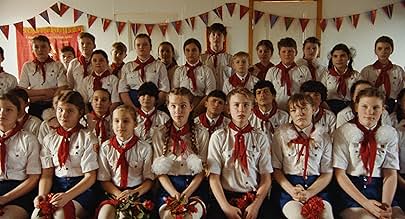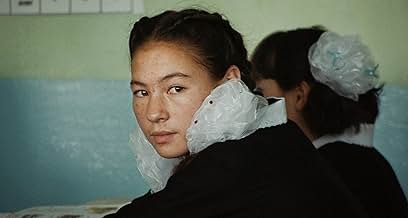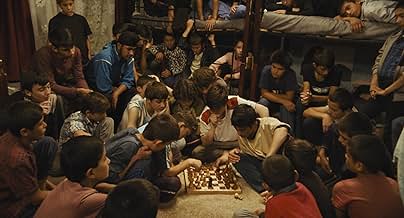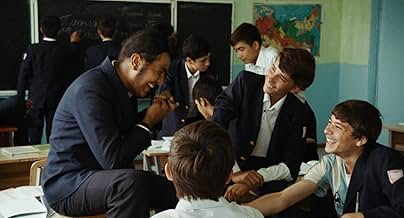Adicionar um enredo no seu idiomaA 15-year-old ticket scalper in Kabul dreams of Bollywood until the Soviets force him into a state facility.A 15-year-old ticket scalper in Kabul dreams of Bollywood until the Soviets force him into a state facility.A 15-year-old ticket scalper in Kabul dreams of Bollywood until the Soviets force him into a state facility.
- Direção
- Roteirista
- Artistas
- Prêmios
- 1 vitória e 7 indicações no total
Avaliações em destaque
Wonderful, a six-handed production (countries) that social criticism we love, bathing in history, a sad time the takeover of Afghanistan by the Soviets, called the War in Afghanistan (1979-1989), and the outcome, the film, could not to be different, the tragedy, the sadness, the defeat, and the interrupted ending, of the unspoken drama...
The film is about a kid named Qodratullah who is forced to live in an orphanage by the pro-Soviet government of Afghanistan in 19189 Kabul. As soon as he arrives in the orphanage which is around 10-15 minutes in, the director lifts her focus and camera from the kid and tries instead to capture every elements in that place such as the kids, the dorms, the teachers and supervisers and so on.
This film is made based on unpublished diaries of Mr. Anwar Hashimi who also stars in this film and he lived in such a place for 8 years when he was a teenager. As a result, the main focus and star of this film is the mentioned orphanage and director Shahrbanoo Sadat reflects on Afghans culture and the country's political state at that time period as a subplot to the life in the orphanage.
The filmmakers have done their best to give us a human, sans cliche film and they have pretty much succeeded doing so. If you've got a chance to see this piece, don't miss it.
This film is made based on unpublished diaries of Mr. Anwar Hashimi who also stars in this film and he lived in such a place for 8 years when he was a teenager. As a result, the main focus and star of this film is the mentioned orphanage and director Shahrbanoo Sadat reflects on Afghans culture and the country's political state at that time period as a subplot to the life in the orphanage.
The filmmakers have done their best to give us a human, sans cliche film and they have pretty much succeeded doing so. If you've got a chance to see this piece, don't miss it.
"The Orphanage" may techincally be a 'Danish' film but it's set in Kabul during the Russian invasion and it is as much a homage to Bollywood as anything and is a much better one than Danny Boyle's "Slumdog Millionaire". It's hero is Qodrat, (Quodratollah Qadiri, wonderful and basically playing himself), a teenage boy living on the streets who is arrested for selling cinema tickets illegally and put in the orphange of the title; it turns out to be the making of him.
Shahrbanoo Sadat's second feature could easily have been full of neo-realist angst but Sadat imbues it with so much affection that the angst completely disappears even if the Bollywood tendency to kitsch is never far away while it's young cast, (non-professionals all), are excellent. This is a political film where the politics take a back seat and a coming-of-age movie devoid of sentimentality. Its sweetness is intoxicating and even when tragedy strikes Sadat never over-emphasizes but simply accepts that this is the way things are. A really lovely film.
Shahrbanoo Sadat's second feature could easily have been full of neo-realist angst but Sadat imbues it with so much affection that the angst completely disappears even if the Bollywood tendency to kitsch is never far away while it's young cast, (non-professionals all), are excellent. This is a political film where the politics take a back seat and a coming-of-age movie devoid of sentimentality. Its sweetness is intoxicating and even when tragedy strikes Sadat never over-emphasizes but simply accepts that this is the way things are. A really lovely film.
War in Afghanistan, lonely children and their hiding places - an orphanage and Hollywood movies where you can get away from the cruelty around.
Illustration by Christina CookThe Orphanage is the second film directed by Shahrbanoo Sadat. It was screened in the Directors' Fortnight section at the Cannes Film Festival. Last year's nominees for the European Film Awards including such films as And Then We Danced (directed by Levan Akin) and Oleg (directed by Juris Kursietis) were also featured in the above-mentioned Section at the 72nd Festival.
Shahrbanoo Sadat's works intend to create a chain which has to consist of 5 separate films. Undoubtedly, the films that have already been made appear to be interconnected. Despite this fact, they are not inseparable. Each film can be viewed as an independent and multifaceted work of art.
Qodrat, a young man who has lost his parents, is the protagonist of the film. He does not look like a tramp or an abandoned child trembling with fear. Qodrat is an entrepreneurial teenager who sells cheap key chains and, what is much more important, resells tickets for popular Bollywood movies at a triple price.
Watching Qodrat getting by, we also see war-ravaged Afghanistan where people sincerely love Indian movies.
When the Bollywood film is on, everyone is reverently watching yet another fight and even adult men dance to the beat of the vibrant music.
All of us associate Bollywood with different movies, be it a famous Seeta and Geeta comedy-drama film, or a modern musical drama film Gully boy. Yet, it is always bright, colorful and with a happy end.
All the turning points in The Orphanage are accompanied by the Bollywood movie excerpts, whose romantic nature not only helps to convey hopes and dreams of the heroes but also disguises their pain and frustration.
Being caught scalping the tickets, Qodrat is taken to an orphanage. There he meets the same children as he is. Children who were left alone; the ones who just want to live as the heroes of their favorite films being able to easily overcome obstacles, being strong and unpredictable.
However, the reality is different. The orphanage, as well as prison, has its own rules. There are different people who do not have much in common; people brought up cherishing different values.
Still, the boy manages to find real friends who he spends endless sunny days with. They have a roof above their heads and hot food. The residents of the orphanage do not think much about the outer world which exists outside their shelter. They live here and now - make friends, dream, learn and misbehave. Director Anwar, both strict and just, maintain harmony and order in the orphanage.
Even if you are just raising children, you cannot isolate yourself from the authorities and the war. You have to fit in, as the ones in power set the rules and responsibilities; they may support as well as punish. It is a heavy burden that lies on Anwar's shoulders.
When the children are being taken care of by the Soviet Union, they learn Russian and even have a chance to visit Moscow. When the Mujahideen come to power, the rules in the orphanage change accordingly - new ideology, new textbooks, the new context of existence.
The Orphanage is a film about lonely children whose world is destroyed by the war. Someone dies on the battlefield, someone stays in order to survive or just surrender a bit later.
Even if you are a child, war can turn you into an adult in a split second.
Shahrbanoo Sadat's works intend to create a chain which has to consist of 5 separate films. Undoubtedly, the films that have already been made appear to be interconnected. Despite this fact, they are not inseparable. Each film can be viewed as an independent and multifaceted work of art.
Qodrat, a young man who has lost his parents, is the protagonist of the film. He does not look like a tramp or an abandoned child trembling with fear. Qodrat is an entrepreneurial teenager who sells cheap key chains and, what is much more important, resells tickets for popular Bollywood movies at a triple price.
Watching Qodrat getting by, we also see war-ravaged Afghanistan where people sincerely love Indian movies.
When the Bollywood film is on, everyone is reverently watching yet another fight and even adult men dance to the beat of the vibrant music.
All of us associate Bollywood with different movies, be it a famous Seeta and Geeta comedy-drama film, or a modern musical drama film Gully boy. Yet, it is always bright, colorful and with a happy end.
All the turning points in The Orphanage are accompanied by the Bollywood movie excerpts, whose romantic nature not only helps to convey hopes and dreams of the heroes but also disguises their pain and frustration.
Being caught scalping the tickets, Qodrat is taken to an orphanage. There he meets the same children as he is. Children who were left alone; the ones who just want to live as the heroes of their favorite films being able to easily overcome obstacles, being strong and unpredictable.
However, the reality is different. The orphanage, as well as prison, has its own rules. There are different people who do not have much in common; people brought up cherishing different values.
Still, the boy manages to find real friends who he spends endless sunny days with. They have a roof above their heads and hot food. The residents of the orphanage do not think much about the outer world which exists outside their shelter. They live here and now - make friends, dream, learn and misbehave. Director Anwar, both strict and just, maintain harmony and order in the orphanage.
Even if you are just raising children, you cannot isolate yourself from the authorities and the war. You have to fit in, as the ones in power set the rules and responsibilities; they may support as well as punish. It is a heavy burden that lies on Anwar's shoulders.
When the children are being taken care of by the Soviet Union, they learn Russian and even have a chance to visit Moscow. When the Mujahideen come to power, the rules in the orphanage change accordingly - new ideology, new textbooks, the new context of existence.
The Orphanage is a film about lonely children whose world is destroyed by the war. Someone dies on the battlefield, someone stays in order to survive or just surrender a bit later.
Even if you are a child, war can turn you into an adult in a split second.
Pros:
1. The dialogue is incredibly grounded and genuine, thus giving the conversations an air of realism to the adolescent boy interactions.
2. The cinematography is gorgeously scaled-back, again adding to the realistic feel.
3. The short intermittent sing-a-long scenes in Hindu-Urdu are exceedingly entertaining, bizarre, and eye-popping.
4. The film does a great job at highlighting the similarities between The West and pre-Mujahideen Afghanistan.
Cons: 1. The movie is needlessly slow-paced and, at times, is a little bit of a chore to get through. 2. Most of the characters are unspeakably plane and uninteresting, with nothing to them (the exception being Qodrat (Quodratollah Qadiri) as he's shown to be thrifty, however that trait is shown early on and is then forgotten about). 3. The acting is generally really stale and uninspiring. 4. The script is unfocused, disjointed, and it often feels that the scenes are just jumping from one-to-the-next with little coherence. 5. There are copious sub-plots introduced, and then carelessly discarded with no resolution. With examples being, Qodrat's possible love interest, or the Russian military presence and Russian diplomatic ties to pre-Mujahideen Afghanistan. 6. The ending death of Anwar (Anwar Hashimi) falls resolutely flat as he's barely a character, and the death isn't set up at all. It also doesn't help that there's this strange sing-and-fight sequence straight after.
Cons: 1. The movie is needlessly slow-paced and, at times, is a little bit of a chore to get through. 2. Most of the characters are unspeakably plane and uninteresting, with nothing to them (the exception being Qodrat (Quodratollah Qadiri) as he's shown to be thrifty, however that trait is shown early on and is then forgotten about). 3. The acting is generally really stale and uninspiring. 4. The script is unfocused, disjointed, and it often feels that the scenes are just jumping from one-to-the-next with little coherence. 5. There are copious sub-plots introduced, and then carelessly discarded with no resolution. With examples being, Qodrat's possible love interest, or the Russian military presence and Russian diplomatic ties to pre-Mujahideen Afghanistan. 6. The ending death of Anwar (Anwar Hashimi) falls resolutely flat as he's barely a character, and the death isn't set up at all. It also doesn't help that there's this strange sing-and-fight sequence straight after.
Você sabia?
- ConexõesFeatures Shahenshah (1988)
Principais escolhas
Faça login para avaliar e ver a lista de recomendações personalizadas
- How long is The Orphanage?Fornecido pela Alexa
Detalhes
- Data de lançamento
- Países de origem
- Idiomas
- Também conhecido como
- The Orphanage
- Locações de filme
- Alemanha(location)
- Empresas de produção
- Consulte mais créditos da empresa na IMDbPro
- Tempo de duração1 hora 30 minutos
- Cor
- Proporção
- 1.85 : 1
Contribua para esta página
Sugerir uma alteração ou adicionar conteúdo ausente
















